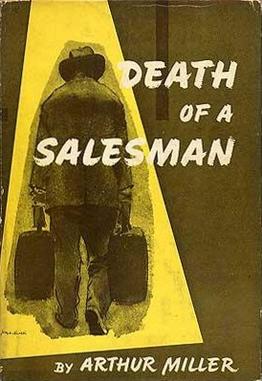Now look back into Linda's requiem. She mentions two things before she says she and Willy are free: she just made the last payment for the house, and nobody (but her) lives in that house anymore. As I pointed out in the previous paragraph, Willy is apparantly bound by his real-life financial burden and family disharmony which made him "not free", but Willy gets more troubles and pain in his flashback and dreams then due to over-expectation. As both reality and dream seem to have harmed Willy, we will never know what Linda mean they were free. Does she mean Willy is freed from his real-life financial burden because the mortgage is finally paid off? Or does she mean Willy is freed from his dream and expectations, since Ben, Biff, Happy and every else are gone? What does Arthur Miller intend to convey in this play?
Friday, February 10, 2017
Death of a Salesman Discussion with Lens (Deconstruction)
In the end of the play Death of a Salesman, Linda says to Willy in his funeral, "I made the last payment on the house today. Today, dear. And there'll be nobody home. We're free and clear. We're free. We're free... We're free...", as a conclusion to Willy's miseries. Throughout the entire Death of a Salesman, Willy Loman is struggling with his tragic life. He is not free, because apparantly he is bound by so many problems like being fired, being hated by Biff, being unable to support his family, etc. As such problems arise, we see Willy then always fall into flashbacks and nostalgia, where he seeks comfort and temporary shelter. One of the significant example is when Willy starts a duologue with Ben, asking, "Oh, Ben, how did you do it? What is the answer? Did you wind up the Alaska deal already?", in p.83, immediately after being fired from his company, but without any knowledge of his previous anger. As shown in Willy's tone, escaping into Ben's shelter and nostalgia gives Willy happiness and frees him from his burden and sufferings in reality. However, it seems like Arthur Miller's design is not as simple as we think, that the words Linda says in the end contains deeper meaning. During Willy's duologue with Ben, as mentioned above, Linda joins the conversation of the two men, interrupting their discussion about venturing in Alaska, and says to Ben, "Don't say those things to him! (Venturing in Alaska) Enough to be happy right here, right now. Why must everybody conquer the world? ... Old man Wagner told him (Willy) that if he keeps it up he'll be a member of the firm, didn't he, Willy?" (p. 84). It is ironic that Linda would mention about Willy's prospect of becoming a member of the firm (that has just fired him in reality) in Willy's flashbacks, where he usually seeks comfort. From this sequence of events, it can be pointed out, that Willy, at least subconsciously, blames Linda for not letting him venture in Alaska, which results into him being fired finally by Howard Wagner. Willy regrets not joining Ben, and Willy gets upset even more, because of this comparison between how successful he could be and how bad he is.
Subscribe to:
Post Comments (Atom)

You did a really good job of finding good examples to use in this view and I especially liked the one about Willy going to Alaska. I liked your reasoning on why he may have blamed Linda a little bit for his bitterness (because she did not want him to go to Alaska). In the end when you came up with the conclusion that the reader will never know what Linda means when she told Willy that they were at last free, I would have liked to hear what your thought was. I know that you gave ideas, but i want to hear what YOU thought she meant.
ReplyDeleteGood depth of commentary--you follow each thread well. It would be fascinating to also look at how Linda may feel confined and/or free at various points--is her freedom subject to the same conditions as Willy's? Grade on Portals.
ReplyDelete